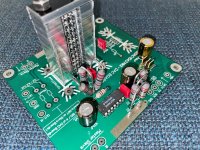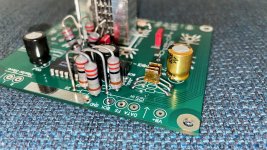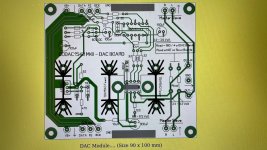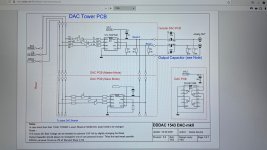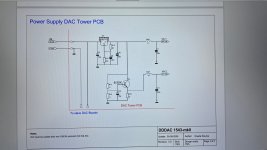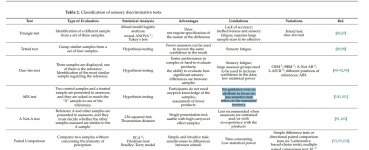Any difference in cables etc is very small and not able to be heard. If you can you have a duff component or a very poor design.Hi, I know what I hear. And yes resistors have their ovn sound. As also cables and capacitors. That you dont hear it is good for you, you dont have to try new stuff. Not trying to be rude. I know many dont hear that and that is fine. You save alot of money ( : Frank
A resistor would be useless if it altered the sound. Its function is to resist not capacitate or inductate !
Tone controls are there to set the equalisation.
Cool, as hypothesis, why not?@Enzo, For a guess, and it is just a guess, if resistors have some unique sound its probably from some small second order physical effects. Say, nickel end caps maybe could add a little low level IMD. Also, while resistors have thermal noise (Johnson noise) while just sitting there, resistors may also produce some excess noise,
But then hypothesis need to be tested and based on results, then confirmed or discarded.
Anything that can be heard, can definitely be measured, since today (and for a few years now) lab instruments are WAY more sensitive and precise than human ears.
I am talking real phenomena such as distortion, frequency response, time delay, etc. , not "opinion" without base,
If two components or systems sound different, will measure different.
One important point: in double blind testing, often aural testing will not find differences and yet Lab testing will detect minute changes, how´s about that?
Say 0.02% distortion vs 0.03% , or -0,1 dB at some frequency vs flat, etc.
Easy peasy for Lab testing, repeatable and consistent, does not depend on Instrument fatigue, caffeine or alcohol consumption, lack of sleep, preconceived ideas, etc. , what´s not to like?
New research will always add more data, refine knowledge, no doubt about that, but there is A TON of excellent hearing and psycho-acoustics research starting in the 30´s, if not earlier.IMHO we're sorta getting into an area that has not been fully researched yet.
Same here.Hopefully continuing research in the field of 'Auditory Scene Analysis' can shed a little more light on such questions over the coming years.
What about sales pitch? That gets used a lot, especially on internet forum.I am talking real phenomena such as distortion, frequency response, time delay, etc. , not "opinion" without base,
One of their favorite reasoning, the stress of test took away their hearing acuity or not enough time was allocated for the listening.If two components or systems sound different, will measure different.
One important point: in double blind testing, often aural testing will not find differences and yet Lab testing will detect minute changes, how´s about that?
Human hearing is not the same thing as human perception of sound. Hearing is the mechanism, perception involves more than auditory input, it involves sensory input from other senses plus expectation bias. The statement, "I know what I hear" is confirmation that expectation bias is at work, and has been proven wrong scientifically. Additionally, auditory memory is extremely short in duration, with measurable fading in 100ms, and becoming significantly unreliable in seconds.
Any audible change must, by definition, alter the stimulus waveform. Any waveform alteration can easily be measured. Because auditory perception invovles more than the hearing mechanism, to evaluate the actual audible impact of any change, all forms of bias must be under control. The "easy" way (which isn't very easy) is to perform a proper Double-Blind test, usually taking the form of an ABX comparison where A and B represent the change, and X randomly equals A or B. The task is to match X. With sufficient trials, statistical significance can be found. The trials need not be forced or rushed, or even done over any specific time. Comparisons can be conducted over days or weeks, there is no time limit. However, there is a forced decision which, if the difference is audible, is easy. But to get enough data to resolve very small differences there should be at least 16 trials. Training the listener for what to listen for very significantly improves their ability to discern differences.
This type of test requires special equipment to handle the randomized trials, and that alone generally takes the process out of the realm of interest for most hobbyists. However, it should be recognized that as a result of extensive research using this method, the threshold of detection for many signal modifiers is quite high. It should also be recognized that biases in the form of expectation (implanted by suggestion) swamp the listeners ability to correctly identify small changes.
The AES paper, "High-Resolution Subjective Testing Using a Double-Blind Comparator" by David Clark (JAES Vol. 30, No. 5) present both the method and the design for a comparator. The paper also details some sample results where a group of listeners was subjected to a form of distortion, and was unable to reliably identify it at levels below 3% on carefully selected material, though 1% might be possible with sine waves.
No resistor or properly implemented capacitor can impose such a high level of distortion of any kind. Transducers (speakers for example) certainly can under certain conditions. But chasing after "resistor color" seems a fools erand in this context, and that whould be fairly easy to prove.
Any audible change must, by definition, alter the stimulus waveform. Any waveform alteration can easily be measured. Because auditory perception invovles more than the hearing mechanism, to evaluate the actual audible impact of any change, all forms of bias must be under control. The "easy" way (which isn't very easy) is to perform a proper Double-Blind test, usually taking the form of an ABX comparison where A and B represent the change, and X randomly equals A or B. The task is to match X. With sufficient trials, statistical significance can be found. The trials need not be forced or rushed, or even done over any specific time. Comparisons can be conducted over days or weeks, there is no time limit. However, there is a forced decision which, if the difference is audible, is easy. But to get enough data to resolve very small differences there should be at least 16 trials. Training the listener for what to listen for very significantly improves their ability to discern differences.
This type of test requires special equipment to handle the randomized trials, and that alone generally takes the process out of the realm of interest for most hobbyists. However, it should be recognized that as a result of extensive research using this method, the threshold of detection for many signal modifiers is quite high. It should also be recognized that biases in the form of expectation (implanted by suggestion) swamp the listeners ability to correctly identify small changes.
The AES paper, "High-Resolution Subjective Testing Using a Double-Blind Comparator" by David Clark (JAES Vol. 30, No. 5) present both the method and the design for a comparator. The paper also details some sample results where a group of listeners was subjected to a form of distortion, and was unable to reliably identify it at levels below 3% on carefully selected material, though 1% might be possible with sine waves.
No resistor or properly implemented capacitor can impose such a high level of distortion of any kind. Transducers (speakers for example) certainly can under certain conditions. But chasing after "resistor color" seems a fools erand in this context, and that whould be fairly easy to prove.
Are you getting your fine cuisine cooking tips from the burger flippers at McDonalds? Just curious.Or does it not matter?
Threads like this one only cause monstrous troll fests here
Hi everyone, thank you for response. Here is where Im have the "problem" ( :
Its on my DDDac1543, you see the tantalum resistors in signal path. Just wondering change 3 of them with Z-foil resistor. The same type that sits in the powersupply part off the construction. Frank
Its on my DDDac1543, you see the tantalum resistors in signal path. Just wondering change 3 of them with Z-foil resistor. The same type that sits in the powersupply part off the construction. Frank
Attachments
...The statement, "I know what I hear" is confirmation that expectation bias is at work...
Where does the term 'expectation bias' come from as it pertains to hi-fi audio reproduction? It seems to appear in certain internet audio forums, but so far I have only found it defined for contexts other than hi-fi, the main one being a bias that affects professional researchers, not diy hobbyists. The other use of the term may be in aviation, and appears to be specific to pilots working with high noise and distortion VHF radios, particularly when the pilot is tired and or under a heavy cognitive workload such as preparing for a landing. Not much like normal hi-fi listening conditions.
Also, aren't you telling other people, "I know what you can't hear?" If so, isn't that closer to the cognitive psychology definition of expectation bias (i.e. perhaps it is you who is erring because of expectation bias).
Do you mean probably not diy hobbyists? Because I am not aware of any peer reviewed published research on that subject.the main one being a bias that affects professional researchers, not diy hobbyists.
Looks so much like a shill post for boutique audio business. Of course he or anyone can tell other humans that he / she can't fly no matter how fast they flap their arms. This is no different unless you know of evidence to otherwise. When I say evidence, it doesn't mean your stories.Also, aren't you telling other people, "I know what you can't hear?" If so, isn't that closer to the cognitive psychology definition of expectation bias (i.e. perhaps it is you who is erring because of expectation bias).
From the list of cognitive biases at: https://en.wikipedia.org/wiki/List_of_cognitive_biases
"Experimenter's or expectation bias, the tendency for experimenters to believe, certify, and publish data that agree with their expectations for the outcome of an experiment, and to disbelieve, discard, or downgrade the corresponding weightings for data that appear to conflict with those expectations.[32]"
The reference [32] leads to the following article: " "A selected history of expectation bias in physics". American Journal of Physics. 74 (7): 578–583."
If someone reads that as in some way being about home hi-fi listening, presumably other readers following along may wish to form their own opinion...
"Experimenter's or expectation bias, the tendency for experimenters to believe, certify, and publish data that agree with their expectations for the outcome of an experiment, and to disbelieve, discard, or downgrade the corresponding weightings for data that appear to conflict with those expectations.[32]"
The reference [32] leads to the following article: " "A selected history of expectation bias in physics". American Journal of Physics. 74 (7): 578–583."
If someone reads that as in some way being about home hi-fi listening, presumably other readers following along may wish to form their own opinion...
Last edited:
[/QUOTE]Where does the term 'expectation bias' come from as it pertains to hi-fi audio reproduction? It seems to appear in certain internet audio forums, but so far I have only found it defined for contexts other than hi-fi, the main one being a bias that affects professional researchers, not diy hobbyists. The other use of the term may be in aviation, and appears to be specific to pilots working with high noise and distortion VHF radios, particularly when the pilot is tired and or under a heavy cognitive workload such as preparing for a landing. Not much like normal hi-fi listening conditions.
Expectation bias is a general term. If you get the meaning in any context, you should be able to get the meaning for audio.
I don't believe I ever said, "I know what you can't hear". To know even a poprtion of that answer would take extensive testing.Also, aren't you telling other people, "I know what you can't hear?" If so, isn't that closer to the cognitive psychology definition of expectation bias (i.e. perhaps it is you who is erring because of expectation bias).
Experimenter's expectation bias is also under control in a true ABX/DBT.From the list of cognitive biases at: https://en.wikipedia.org/wiki/List_of_cognitive_biases
"Experimenter's or expectation bias, the tendency for experimenters to believe, certify, and publish data that agree with their expectations for the outcome of an experiment, and to disbelieve, discard, or downgrade the corresponding weightings for data that appear to conflict with those expectations.[32]"
The reference [32] leads to the following article: " "A selected history of expectation bias in physics". American Journal of Physics. 74 (7): 578–583."
If someone reads that as in some way being about home hi-fi listening, presumably other readers following along may wish to form their own opinion...
Experimenter's expectation bias is also under control in a true ABX/DBT.
Not really. There are all sorts of ways bias can affect well-intentioned research efforts. ABX is test a protocol, nothing more. Using it on humans is far from foolproof. For one thing it has lower sensitivity than DBT A/B protocol. ABX is also more likely to produce false negative statistical errors. That can be overcome with sufficient training of test subjects, but doing it properly is not something taught in engineering school.
Why are you so against double blind test? It's as if you have some boutique audio business agenda to push... oh, wait, I just remembered, "Next year one of Jam's audio businesses will start selling cables designed by him."ABX is test a protocol, nothing more. Using it on humans is far from foolproof. For one thing it has lower sensitivity than DBT A/B protocol. ABX is also more likely to produce false negative statistical errors. That can be overcome with sufficient training of test subjects, but doing it properly is not something taught in engineering school.
If the ABX DBT protocol is properly carried out the experimenters bias is under control. I own the Clark ABX system. I’ve conducted many tests. You get statistics which are easily analyzedNot really. There are all sorts of ways bias can affect well-intentioned research efforts.
Yes, exactly. One that has the capability to control bias. A/B has no such controlsABX is test a protocol, nothing more.
Sorry, incorrect. The first level in an ABX is exactly the A/BUsing it on humans is far from foolproof. For one thing it has lower sensitivity than DBT A/B protocol.
A properly conducted ABX/DBT produced data. There are no “false negatives”. It’s just data. No statistical errors unless someone does the math wrong.ABX is also more likely to produce false negative statistical errors.
As I already noted. That was in the Clark paper. Old news.That can be overcome with sufficient training of test subjects,
“Engineering school”? Really? You have no idea.but doing it properly is not something taught in engineering school.
Congratulations! You have just successfully and precisely quoted all the boilerplate objections to ABX/DBT that it’s detractors always fall back on. Not one is substantiated by actual science. The objections are part of a complex set of beliefs that are not provable or repeatable, but those how have adopted them still cling to for dear life lest their world be shattered by reality.
Please see summary of test limitations attached below. Excerpted from, "An Overview of Sensory Characterization Techniques:
From Classical Descriptive Analysis to the Emergence of Novel Profiling Methods"
IME the memorization part is what can be hardest to learn, particularly so for very low level weird and or unusual electronic sounds.
Also, as respected forum member PMA observed after personally learning how to pass ABX, the protocol requires fatiguing sustained concentration to pass a test, in contrast to the ease of sighted listening. People are not usually so quick to accuse PMA of using a 'playbook.'
EDIT: For the record and in response other accusations, I have said on numerous occasions that I recommend periodic blind testing for everyone to help maintain calibration as to what is real and what isn't.
From Classical Descriptive Analysis to the Emergence of Novel Profiling Methods"
IME the memorization part is what can be hardest to learn, particularly so for very low level weird and or unusual electronic sounds.
Also, as respected forum member PMA observed after personally learning how to pass ABX, the protocol requires fatiguing sustained concentration to pass a test, in contrast to the ease of sighted listening. People are not usually so quick to accuse PMA of using a 'playbook.'
EDIT: For the record and in response other accusations, I have said on numerous occasions that I recommend periodic blind testing for everyone to help maintain calibration as to what is real and what isn't.
Attachments
Last edited:
To the point of obsession.Why are you so against double blind test?..........
Been noticing the same for a long time now.
Maybe when claimed measurements are impossible to sustain, then "best" strategy is to attack the meter?
- Home
- Design & Build
- Construction Tips
- Placement of resistors in signal path.
